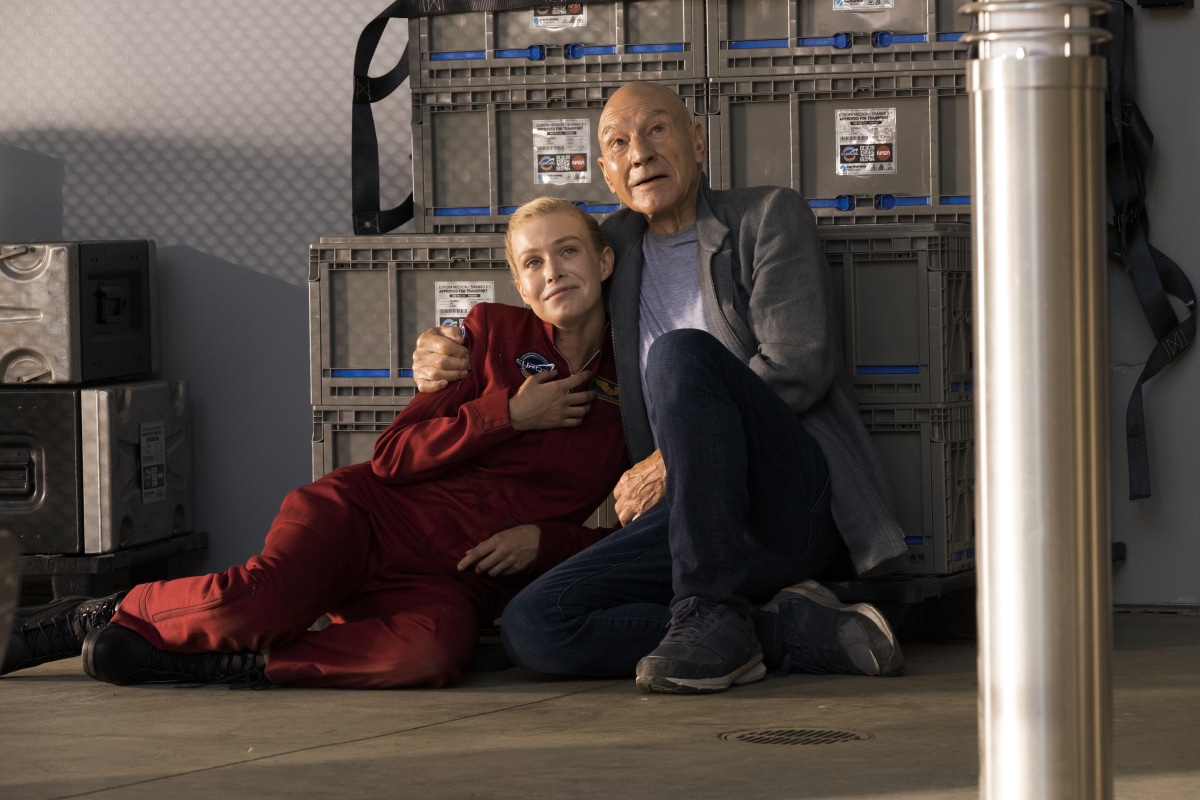This discussion and review contains some spoilers for Star Trek: Picard season 2, episode 10, “Farewell.”
One of the more frustrating aspects of modern Star Trek is the extent to which the franchise seems compelled to embrace long-form serialization without doing any of the hard work involved.
If “Monsters” illustrated the uncanny valley that Star Trek: Picard occupies between prestige television and classic Star Trek, then “Farewell” demonstrates just how uncomfortable the franchise is at telling season-long stories. “Farewell” takes the audience back to the opening moments of the season premiere, “The Star Gazer,” in what should be a dramatic payoff to a season-long arc. Theoretically, the second season of Picard has come “full circle,” back around to where it started.
This is a hallmark of prestige television. This sort of storytelling demonstrates a confidence and assuredness from the production team, signaling to the audience that they are in reliable hands. It is a technique regularly employed by shows like Breaking Bad and Better Call Saul, which will often provide viewers teasers depicting out-of-context images from later in the episode or even the season (like a burnt pink teddy bear or a car-trunk machine gun), promising they will make sense in context.
Ideally, by the time that “Farewell” revisits the events of “The Star Gazer,” the audience has seen enough in the intervening eight Star Trek: Picard episodes that the scenes play dramatically differently. The characters have changed and grown, their relationships shifted and evolved, to such an extent that the sequence takes on an entirely new meaning. In a well-constructed season-long arc, this payoff offers an emotional catharsis that elevates the entire season.

On paper, it’s possible to see how this would actually work. Q (John de Lancie) has one final conversation with Jean-Luc Picard (Patrick Stewart), and the two part as friends. Agnes Jurati (Alison Pill) has spent four centuries rebuilding and reinventing the Borg Collective, and Picard is able to accomplish the ultimate diplomatic coup when they apply for “provisional membership of the Federation.” Picard himself has grown to become more comfortable and more accepting.
Unfortunately, “Farewell” doesn’t pull any of that off. Very little of the episode’s developments feel particularly organic or compelling. A large part of that is down to the fact that Picard is a show much more interested in plot than character, and little of the season’s plot fits with what the dialogue insistently tells the audience about its characters. As a result, a lot of the second season feels like a jumble of things happening, rather than characters evolving.
This is most obvious in the conversation between Q and Picard. In isolation, this is a charming scene. Patrick Stewart and John de Lancie are both fine actors and good screen partners. There is something moving in the idea of Q effectively rewriting the universe as one parting gift to an old friend. “Even gods have favorites, Jean-Luc, and you’re one of mine,” Q admits, gently cupping Picard’s face, in what feels like a rare moment of complete honesty from the trickster.
Tying back into one of the big recurring themes of Picard, Q argues that this entire extended adventure has effectively been a therapy session for Picard. “I am moving on,” Q explains of his choice. “In your parlance, I am dying. Alone. I am dying alone.” Q explains that this big trial was always deeply personal to both Q and Picard. “You ask me why it matters,” Q confesses. “It matters to me.” There is just one problem here: Picard never felt particularly intimate or personal.

From the outset, the stakes of the second season of Star Trek: Picard were galactic and universal in nature. In “The Star Gazer,” the Federation’s entire fleet is almost assimilated by the Borg. In “Penance,” the entire timeline is rewritten to create a dystopian alternate reality. Even within his conversation with Q, Picard points to the deaths of Tallinn (Orla Brady) and Elnor (Evan Evagora). While Q later reverses the death of Elnor, he shrugs off both losses.
Even “Farewell” doesn’t seem particularly convinced by Q’s arguments. It features the return of Wesley Crusher (Wil Wheaton), who recruits Kore (Isa Briones) to join him while also fashioning together a web of Star Trek continuity by revealing that “the supervisors” from “Assignment: Earth” were the same aliens as the Traveler in “Where No One Has Gone Before.” They work to protect the “grand tapestry” of the universe that is only ever “a thread-pull away from annihilation.”
Even if the audience accepts Q’s arguments, there are still significant difficulties reconciling them to the larger show. Q vows to leave Picard “unshackled from the past,” but that rings false given the confirmation that the rest of the cast of The Next Generation are joining the third season of Picard. He also claims to have relieved Picard of some deep-set trauma, vowing, “If I leave you, I leave you free.” However, there was no hint of that trauma in Picard’s past before “The Star Gazer.”
More to the point, if the second season of Picard is about Q helping Picard move past his trauma, how does that pay off in the season finale? Returned to the Stargazer bridge, Picard aborts the self-destruct sequence and declines to sacrifice himself and his crew. However, this decision isn’t rooted in character. He doesn’t abort the sequence because he has a new perspective on life. Instead, it’s rooted in plot exposition. He knows that Jurati is the Borg Queen, which is just plot information.

Similarly, all of this leads into a crammed final 15 minutes in which “a galactic event” materializes completely disconnected from the actual plot of the season around it, creating an existential crisis that threatens to destroy “billions of lives.” Even “All Good Things…,” an episode that was clearly a major influence on this season, was smart enough to tie its anomaly of the week to the main plot. Instead, “Farewell” just pulls it out of nowhere, for some last-minute heroism.
There’s a sloppiness to the plotting of the second season of Picard that undermines any compelling character or plot work. This is most obvious in the season’s somewhat nonsensical internal logic when it comes to time travel, even by the standards of the franchise. When Picard met Guinan (Ito Aghayere) in the past, she didn’t seem to remember their earlier encounter in “Time’s Arrow.” The production team argued that this was because of a disruption of the timeline.
However, when Picard reunites with Guinan (Whoopi Goldberg) in the future, she retains a perfect memory of their adventures over previous episodes, allowing her to deliver an exposition dump about what happened to Cristobal Rios (Santiago Cabrera) after the crew left him in the 21st century. “Farewell” opens with Picard noting that his ancestors recalled finding bullet holes in the chateau, implying that the shootout in “Hide and Seek” played out according to a predetermined paradox.
To be fair, the temptation with these sorts of narrative choices is to excuse them as “timey wimey” nonsense. Indeed, much like the sequence in which Adam Soong (Brent Spiner) removes a sheet of “fast-acting and fatal” neurotoxin from his palm using his other ungloved hand, these problems would be easier to excuse if the story worked in other ways. After all, the logic of Star Trek has never been entirely water-tight, but that doesn’t matter if the episode in question is compelling enough.

Instead, “Farewell” follows the path of least resistance without any underlying sense of character or story. The episode’s first half plays as an extended homage to “Assignment: Earth,” about a bunch of time travelers trying to ensure an important space launch. However, while “Assignment: Earth” has long been a point of fixation and obsession for Star Trek fans, it was a fairly mediocre episode of television, with Gene Roddenberry trying to use it as a stealth pilot for a different show.
As with so much of the second season of Star Trek: Picard, “Farewell” instead leans on easy nostalgia in place of these storytelling fundamentals. This is most obvious on the soundtrack, which replays familiar audio cues from The Next Generation and First Contact to tickle the audience’s nostalgia receptors. The idea seems to be that if Picard references enough other Star Trek stories and sounds enough like other Star Trek stories, it won’t matter that the internal narrative just doesn’t work.
It is a common problem with modern Star Trek shows pushing for season-long arcs. Some fans will insist that the problem is that the production team needs to plan more carefully, but that’s not really the problem. After all, much of the scripting on the best shows is improvised. Barry heavily rewrote and reshot its third season to make it work. Better Call Saul improvised arcs for characters like Kim Wexler (Rhea Seehorn) and Nacho Varga (Michael Mando).
“Farewell” demonstrates the folly of building epic season-long arcs for a show that often struggles with the fundamentals on an episode-by-episode basis. Ironically for an episode about ensuring a rocket launch, “Farewell” doesn’t stick the landing.






Published: May 5, 2022 11:00 am